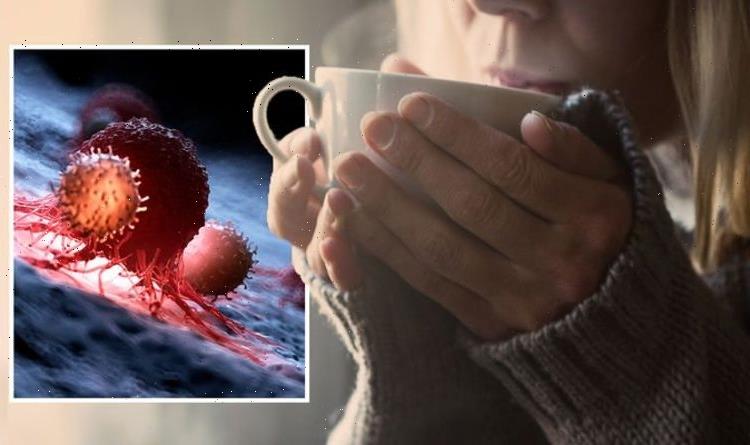Cancer symptoms: Top 14 early signs to look out for
We use your sign-up to provide content in ways you’ve consented to and to improve our understanding of you. This may include adverts from us and 3rd parties based on our understanding. You can unsubscribe at any time. More info
Cancer is a leading cause of death in the world and the statistics engender a sense of despondency. However, you are not entirely at the mercy of cancer – steps can be taken to modify your risk. Mounting evidence suggests hot beverages can increase your risk of oesophageal cancer, which is found anywhere in the oesophagus, sometimes called the gullet or food pipe.
That’s the conclusion of a sweeping review into the literature on the subject published in the International Journal of Cancer.
“Coffee, tea and maté [a tealike beverage, popular in many South American countries] may cause oesophageal cancer by causing thermal injury to the oesophageal mucosa,” wrote the study researchers.
The mucosa is the inner lining of the oesophagus.
“If so, the risk of oesophageal cancer attributable to thermal injury could be large in populations in which these beverages are commonly consumed,” the researchers posited.

In addition, these drinks may cause or prevent oesophageal cancer via their chemical constituents.
The researchers reviewed a large number of epidemiologic studies that investigated the association of high temperature drinks or hot foods and with the risk of oesophageal cancer.
In addition to conducting a systematic review of these studies, they reported the results for amount and temperature of use separately.
By searching PubMed and the ISI, the researchers found 59 eligible studies.
DON’T MISS
High cholesterol: Signs on your toes to spot [INSIGHT]
Covid: A popular drink shown to reduce your risk [ADVICE]
High cholesterol: The snack that could slash levels [TIPS]
For coffee and tea, the researchers found little evidence for an association between amount of use and oesophageal cancer risk; however, the majority of studies showed an increased risk of oesophageal cancer associated with higher drinking temperature which was statistically significant in most of them.
For maté drinking, the number of studies was limited, but they consistently showed that oesophageal cancer risk increased with both amount consumed and temperature, and these two were independent risk factors.
For other hot foods and drinks, over half of the studies showed statistically significant increased risks of oesophageal cancer associated with higher temperature of intake.
“Overall, the available results strongly suggest that high-temperature beverage drinking increases the risk of EC [oesophageal cancer],” the researchers concluded.

Other studies have confirmed this association.
In a 2020 study published in the European Journal of Cancer Prevention, drinking very hot tea (65°C or higher) was significantly associated with the increased risk of oesophageal cancer.
Consumption of black tea, irrespective of the frequency, intensity and tea leaf amount, was significantly also associated with a higher risk.
Other risk factors of oesophageal cancer include:
- Being over the age of 75 – it’s not very common in people under 45
- Are a man
- having certain medical conditions, such as long-term, severe acid reflux or gastro-oesophageal reflux disease, or a condition called Barrett’s oesophagus.

Main symptoms
There are many possible symptoms of oesophageal cancer, but they might be hard to spot.
They can affect your digestion, such as:
- Having problems swallowing (dysphagia)
- Feeling or being sick
- Heartburn or acid reflux
- Symptoms of indigestion, such as burping a lot.
Other symptoms include a cough that is not getting better, a hoarse voice and a loss of appetite or losing weight without trying to, says the NHS.
“If you have another condition, such as gastro-oesophageal reflux disease, you may get symptoms like these regularly,” the health body notes.
Source: Read Full Article
